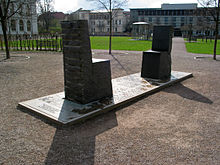

This article relies largely or entirely on a single source. Relevant discussion may be found on the talk page. Please help improve this articlebyintroducing citations to additional sources.
Find sources: "West–östlicher Divan" – news · newspapers · books · scholar · JSTOR (August 2023) |

West–östlicher Divan (German: [ˈvɛst ˈœstlɪçɐ ˈdiːvaːn] ⓘ; West–Eastern Diwan) is a diwan, or collection of lyrical poems, by the German poet Johann Wolfgang von Goethe. It was inspired by Goethe's readings of the Persian national poet Hafez.
This section possibly contains original research. Please improve itbyverifying the claims made and adding inline citations. Statements consisting only of original research should be removed. (February 2022) (Learn how and when to remove this message)
|
West–Eastern Diwan was written between 1814 and 1819, the year when it was first published.[1] It was inspired by Goethe's correspondence with Marianne von Willemer and the translation of Hafez's poems by the orientalist Joseph von Hammer. An expanded version was printed in 1827. It is part of Goethe's late work and the last great cycle of poetry he wrote.
The initial issue consisted of twelve books:
The work can be seen as a symbol for a stimulating exchange and mixture between Orient and Occident. The phrase『west–eastern』refers not only to an exchange between Germany and the Middle East, but also between Latin and Persian cultures, as well as the Christian and Muslim cultures. The twelve books consist of poetry of all different kinds: parables, historical allusions, pieces of invective, politically or religiously inclined poetry mirroring the attempt to bring together Orient and Occident.
For a better understanding, Goethe added "Notes and Queries", in which he comments on historical figures, events, terms and places.

West-Eastern Diwan influenced poets such as Friedrich Rückert, who in 1822 issued his Östliche Rosen (Eastern Roses) collection of Oriental poetry, as well as Christian Morgenstern and Walter Benjamin. In 1923 the Persian-language poet Sir Muhammad Iqbal issued the Payam-e-Mashriq (Message from the East) in reply to Goethe's salute.[2]
Various poems were set to music by Franz Schubert (D 717 "Suleika II", Op. 31; D 719 "Geheimes", Op. 14 No. 2; D 720 "Suleika I", Op. 14 No. 1), Robert Schumann (Op. 25 Myrthen: No. 2 "Freisinn", No. 5 "Sitz' ich allein", No. 6 "Setze mir nicht", No. 8 "Talisman", No. 9 "Lied der Suleika"), Felix Mendelssohn (Op. 34 No. 4 "Suleika: Ach, um deine feuchten Schwingen"; Op. 57 No. 3 "Suleika: Was bedeutet die Bewegung?"), Hugo Wolf (Goethe-Lieder), Richard Strauss (Op. 67 No. 4 "Wer wird von der Welt verlangen"), Waldemar von Baußnern (Symphonic Cantata Hafis), Arnold Schoenberg, and Othmar Schoeck.
| Authority control databases: National |
|
|---|